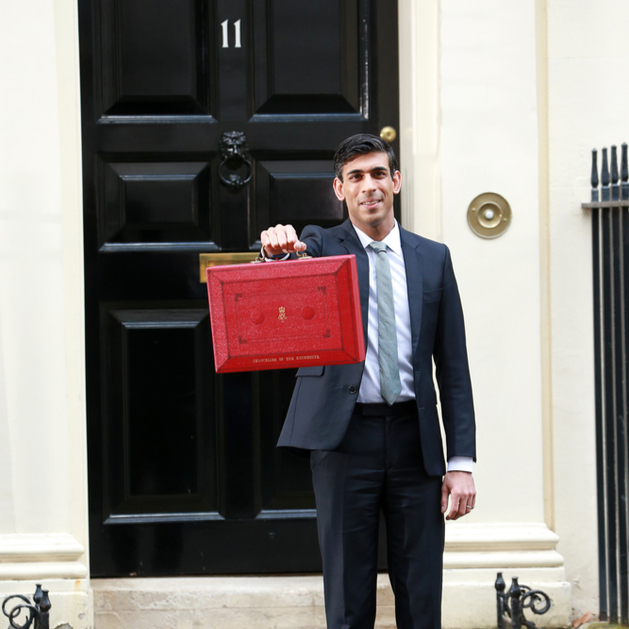Ahead of this week’s Budget, delivered by the newly appointed Chancellor of the Exchequer, the Right Honourable Rishi Sunak, there was widespread anticipation as to what the contents of his Budget would be.
It was expected that he would announce significant increases in public spending and investment in line with the pledges made by the Conservative Party during the recent General Election. As a result of the announcements made this week, total new investment into the UK will be around £30 billion, intended to boost the economy and provide the financial support to combat the effects of the coronavirus outbreak and any resultant economic downturn.
In recent months the continuing outbreak of Coronavirus has dominated headlines. Unsurprisingly, it also played a central role in the Budget. The outbreak has now been officially labelled a global pandemic by the World Health Organization (WHO), highlighting the severity of the illness and the potential threat that WHO believe that we all face.
To date, we have seen countries, such as Italy and Ireland, introduce nationwide measures in an attempt to contain and reduce spread of further infection. Many experts expect the virus to spread further at a rapid rate, resulting in similar measures in other countries around the world. This has the potential to cause widespread economic disruption to a wide range of business sectors both in the UK and internationally.
Along with measures to bolster public services, Rishi Sunak unveiled a range of plans to provide immediate support to the UK in the face of the coronavirus outbreak. There has been well publicised concern that the NHS is already stretched and may struggle to cope with a sudden large influx of patients requiring emergency treatment, echoing the situation that may Italian hospitals have found themselves in.
The measures announced include a £5 billion emergency response fund to support the NHS and other public services. Additionally, he pledged that the NHS and other key emergency services would receive whatever funding and assistance they require to effectively combat this outbreak.
In addition to the health concerns that this virus presents, the Chancellor also addressed the potential ramifications that this could have on small to medium businesses across the UK. Those people who are required to self-isolate, irrespective of whether they are showing symptoms, will be entitled to Statutory Sick Pay in a bid to ensure that people take the necessary precautions without fear of financial hardship. This measure will be particularly important for those on lower incomes.
Additionally, similar measures have been put in place for those who are self-employed who will be able to claim contributory employment support allowance from day one rather than having to wait for a week.
Local councils who have been hit hard with budget cuts over the past few years will have access to a £500 million hardship fund in order to assist those who are most vulnerable in society and affected by the coronavirus outbreak.
In a bid to maintain confidence and allow small businesses to trade through what could be a difficult period it was announced that small firms will be able to apply for business interruption loans of up to £1.2 million. Furthermore, companies with fewer than 250 staff will be fully refunded for sick pay payments made for the first two weeks.
There was little in the way of new announcements or significant change in terms of personal taxation with the main announcement being confirmation that the threshold for National Insurance contributions will rise to £9,500. This will mean that those earning more than £9,500 will be on average around £85 per year better off.
We had predicted that there was a potential for widespread changes to the pension system and in particular, it was widely forecast that the tax relief on pension contributions could be cut the equivalent of Basic Rate Tax relief for everyone. This, however, was not mentioned and the only announcement with regards to pensions was that the tapering of the annual allowance will be recalculated to avoid excessive taxation particularly for higher earners with final salary pensions, such as NHS consultants.
This has been a problematic area with many senior NHS consultants being taxed on their pension contributions to an extent that it was disadvantageous for them to continue working. The measures announced appear to resolve this issue for the majority of higher earners with final salary pensions and we will report the details of this in greater depth separately.
As we anticipated, there was a significant change to the Entrepreneur’s Relief. This relief allowed individuals to sell businesses they owned and only be subject to 10% taxation on the proceeds, subject to a £10m lifetime limit. Whilst Mr Sunak was expected to scrap this relief altogether he found a compromise by dropping the lifetime limit to £1m. Although this will only affect a small number of people across the UK, many of Foresight’s clients who will be impacted by this over the next few years. We will look carefully at the best strategies for entrepreneurs planning to sell their business.
Some of the biggest commitments and increases in spending were centred around transport, infrastructure and housing. More than £600 billion has been set aside with the spending to be allocated towards improving the roads and rail network as well as significantly improving the broadband infrastructure across the UK. Part of this budget will also be allocated to housing with the key priority to produce more affordable housing across the country easing the housing crisis somewhat.
The Chancellor also unveiled a range of spending pledges to improve the quality of the road network across the UK with £27 billion being allocated for improvement and building of new motorways and arterial roads as well as a £2.5 billion fund to tackle potholes and roads in need of resurfacing across England over the next five years.
Amongst a range of other measures, Rishi Sunak also detailed £1 billion of funding to remove flammable cladding from tower blocks and buildings across the UK in the wake of the Grenfell crisis. Whilst this is arguably overdue, it is a welcome announcement all the same.
Not only is this variety of measures welcome in order to improve public services and vital infrastructure across the UK, but the spending of this money should also provide a boost to the economy providing jobs and a boost in economic activity.
The Chancellor also set out the forecasted growth plans for the UK over the next several years. Economic growth is predicted to be 1.1% for 2020 revised down from 1.4% a year ago. However, it should be noted that this figure does not take into account the impact of a worsening of the coronavirus outbreak, which could further dampen what is already the slowest growth rate since 2009. Growth is then predicted to rebound to 1.8% in 2021/22, although it should be noted that currently there are so many unknown variables affecting both domestic and global growth that accurate forecasting is even more difficult currently than it normally is. Inflationary pressures in the UK are forecast to remain mild and within the Bank of England targets with expectation of 1.4% inflation this year potentially rising to 1.8% next year.
The spending plans outlined above represent a significant change of direction for the Conservative government and has created the need to borrow £14.6 billion more this year than was previously forecast with total additional borrowing of £96.6 billion forecast by 2023/24 to fund the spending commitments outlined.
There are a number of areas such as measures to tackle the social care crisis that were surprisingly absent from this Budget. However, the overall theme is one of increased investment and expenditure within the UK, which will almost certainly provide the catalyst for improved economic growth as well as providing overdue funding to ailing public services after more than a decade of financial austerity across the UK.
If you have any queries about how the announcements in the Budget will affect you or whether you should take any actions with your financial plans on the back of this please contact our team at Foresight Wealth Strategists where one of our expert advisers can guide you through this and how it might affect you.
Author
-

Foresight Wealth Strategists have been providing extensive financial planning advice to Hale and the surrounding areas for 25 years - info@foresightws.co.uk
View all posts
















































